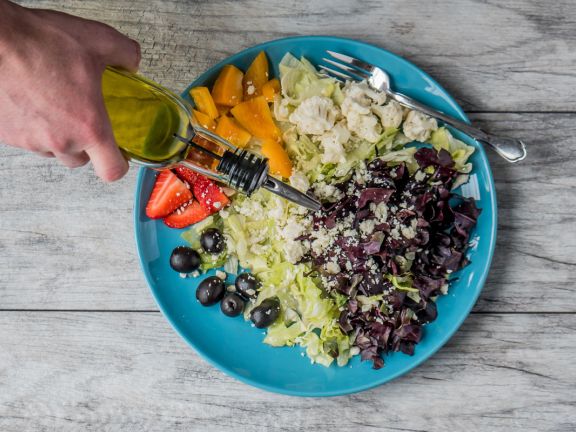
What types of oil are in your kitchen, dear readers? The most popular cooking oil is definitely olive oil. It is available in a wide variety of qualities and is a good and healthy cooking oil. Today, however, I would like to introduce you to four oils that make the menu a little more exciting and have various health benefits.
These oils are cold-pressed oils. This means that they were not heated above 40 degrees Celsius during pressing. This gentle pressing means that the end product is more natural than refined oil, which is heated to a temperature above 100 degrees Celsius.
Important for all cold-pressed oils presented: Look out for excellent organic quality, which you can get from health food shops, for example. This is because the quality of the oilseeds is very important in cold pressing. If they contain pesticides or are infested with mould, these harmful substances migrate one-to-one into the oil. It is therefore worth investing a little more. It is best to buy small portions, as cold-pressed oils only have a limited shelf life. In any case, you should store the oils in the refrigerator.
NOTE!
Cold-pressed oils are very healthy, but should always be bought in organic quality and should not be heated.
Rapeseed oil
My favourite for dressing salads is cold-pressed, virgin rapeseed oil. It has a slightly nutty flavour and is rich in vitamins and phytochemicals. Among other things, it contains the fat-soluble vitamins A, E and K, which have an antioxidant effect and thus protect the cells.
Rapeseed oil also helps to reduce the level of harmful LDL cholesterol in the blood. Caution: Please only use cold-pressed rapeseed oil for cold dishes and never for frying. If it is heated too high, the chemical composition of the oil changes and unhealthy trans fatty acids can form.
Pumpkin seed oil
Strictly speaking, pumpkin seed oil is not a cold-pressed oil, as the pumpkin seeds are roasted before being pressed. After roasting, however, the seeds are pressed without adding any further heat. Dark green and viscous, pumpkin seed oil is a delicious treasure: its ingredients, such as vitamin E and linoleic acid in particular, reduce high cholesterol levels and prevent cardiovascular diseases.
The oil is not recommended for cooking and baking; however, pumpkin seed oil is ideal for salad dressings or for flavouring vegetable dishes, purees or pasta.
Linseed oil
Linseed oil was long regarded as a poor man’s oil. However, the nutty, golden yellow oil has long since shed this reputation. Linseed oil is the undisputed leader in omega-3 content and easily outstrips rapeseed oil and salmon. The alpha-linolenic acid it contains can inhibit inflammation, promote blood clotting and dilate blood vessels. And linseed oil is even said to be good for the soul: Several studies suggest that linseed oil can alleviate depression or anxiety, for example. If you don’t like the flavour of linseed oil, you can mix it with neutral oils such as rapeseed oil. Important: Linseed oil must also not be heated.
It is one of the most expensive oils – which is understandable when you consider that grape seed oil is made from the tiny seeds of grapes. But investing in a small bottle of cold-pressed grape seed oil is well worth it: not only does it taste very good, it also contains 90 per cent unsaturated fatty acids. Grape seed oil also provides valuable vitamin E, which protects the body’s cells from free radicals. The oil tastes very good on salads, but also adds flavour to pasta dishes. Like all cold-pressed oils, it is not suitable for frying.